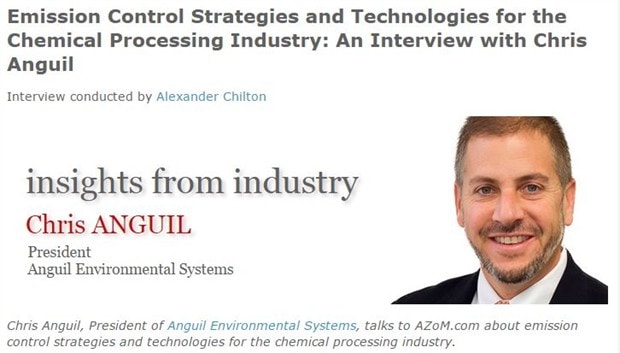Anguil Expands Wastewater Treatment Offerings
1,408 CommentsAnguil is announcing that we have signed an exclusive product licensing agreement with American Micro Detection Systems, Inc. (AMDS) of Stockton, California. Under the terms of the agreement AMDS will allow Anguil to exclusively present the REX product line to their Fortune 50 customers in the electronics space. The AMDS CEO Robert Keville stated that, “This agreement opens a new verticle market for AMDS products with substantial sales potential.” He further stated that, “The total market value to AMDS through this agreement will, over the term of the license and in aggregate, total tens of millions of dollars in revenue to AMDS. We are very excited about working with Anguil and having them as a sales channel partner.”
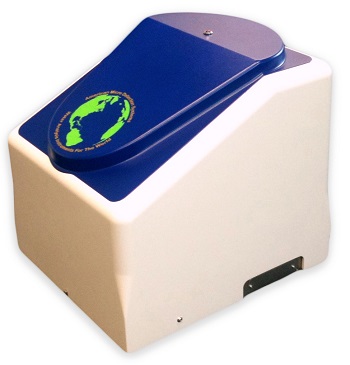
About AMDS
American Micro Detection Systems, Inc. (AMDS) is a privately held technology company located in Stockton, CA with research and development facilities in Livermore, CA. AMDS develops and markets world class analysis instruments specifically geared towards the water sector. AMDS manufactures innovative state-of-the-art, real time fluids analysis instruments that allow for autonomous monitoring of fluid flow streams at the source of interest. AMDS products serve any industry that utilizes water in their process from pulp and paper to agriculture to electronics to mining and oil.
For more information visit: www.anguil.com/aqua or contact Mr. Mike Munnagle, Director of Business Development at mike.munnagle@anguil.com.
Emissions Webinar
1,265 CommentsEHS Daily Advisor is hosting a webinar this September on emission destruction technologies for compliance with MACT, NSPS, NESHAP, and state VOC and HAP regulations. Sponsored by Verantis Environmental Solutions Group and Anguil Environmental Systems, the complimentary webcast will provide attendees with a general overview of industrial air pollution control technologies and the pollutants they target. In addition, participants will have the opportunity to earn continuing education credits for attending!
The presenters will use case studies to explain the destruction capabilities, operating costs and limitations to the various technologies. Join us to learn:
- Which abatement systems are best suited for certain VOC, HAP, and odor control applications.
- How oxidizers and scrubbers are sized and applied on various industrial processes.
- The latest operating cost reduction strategies for industrial air pollution control systems.
- How air pollution control regulations are driving technology advancements.
Already an expert on air pollution control? That’s OK! We’ll also offer new information on regulatory changes and technology advancements.
Overview
Title: Air Pollution Abatement Technology Overview
Duration: 1 Hour
NOW ON DEMAND! CLICK HERE
Anguil Expands Environmental Offerings to Include Water Treatment Solutions
1,405 CommentsAfter nearly forty years in the air pollution control industry, Anguil Environmental is announcing the creation of a new water treatment division appropriately named Anguil Aqua Systems. The new initiative will leverage Anguil’s extensive engineering experience and process knowledge.
Anguil has spent the past three years researching the market, forming a technical team and expanding their knowledge of water pollution technologies and techniques before officially forming Anguil Aqua. During this time, they successfully completed several water treatment projects in the remediation and industrial manufacturing markets. Building upon these achievements, the company is uniquely positioned to provide single source responsibility for fully engineered, customized and integrated air and water treatment solutions.
For more information visit the Anguil wastewater treatment web pages.
Educational Seminars on Thermal & Catalytic Oxidation Technologies
1,412 Comments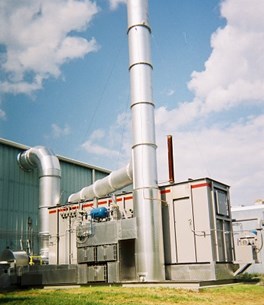
-
- The Principles of Oxidation
- An Overview of Emission Control Technologies
- Regenerative Thermal Oxidizers (RTOs)
- Catalytic Oxidizers
- Thermal Recuperative Oxidizers
- Direct Fired Oxidizers & Vapor Combustors
- Emission Concentrators
Operating Cost Comparison & Reduction Strategies
The presentation will also address applicable industries and applications, unique air streams, concentration ranges, Destruction Rate Efficiency (DRE), operating costs, available options and equipment selection.
Contact Anguil today to schedule a meeting either at your office or via a webinar. Depending on your local requirements, attendees may qualify for Professional Development Hours (PDHs) or Continuing Education Credits/Units (CECs/CEUs).
Publisher Interview with Chris Anguil
1,415 Comments
AC: Could you please provide our readers with a brief introduction to the industries that Anguil Environmental works within?
CA: Our thermal and catalytic oxidizer systems are applied on any industrial process that is regulated for Volatile Organic Compounds (VOCs), Hazardous Air Pollutants (HAPs) or Nitrogen Oxides (NOX). Some of these industries include chemical processing, pharmaceutical, automotive, composites, petroleum, printing and ethanol but there are several applications in miscellaneous industries that are also regulated.
Domestically, the control of these off-gases are enforced under the Clean Air Act but regulations are taking hold throughout the world and we are prepared to handle the increased demand. With regards to the chemical processing industry specifically, it has long been regulated for these emissions.
The applications where oxidizers are applied in a chemical plant can vary greatly in both volume and composition. I think our ability to supply custom air pollution control solutions has been crucial to our success on applications in this industry.
AC: How has Anguil Environmental grown and changed since the company was founded in 1978?
CA: Anguil has evolved into a global solutions provider, not just an equipment manufacturer. We did this while holding onto our family founded principals without the financial backing that many larger corporations have access to. There are challenges to organic growth but I think there is also value in the experiences learned. We are continually looking for ways to improve our offering by utilizing the strengths of our employees.
One of our more recent growth initiatives was implementing a process improvement program called Stage Gate. It forced us to take a closer look at how business is routed through our company. We are much more methodical about our project management now which has reduced errors and dramatically improved efficiencies.
Essentially a project cannot move to the next stage of production without making sure certain checks and balances have been met. That’s not to say that an engineer can’t still walk drawings on to the shop floor to expedite a project but they won’t start cutting metal until certain criteria is met. Ultimately we are able to offer customers a higher quality system at a lower price.
AC: Why is it important that companies operating in the Chemical Processing Industry use emission control technology and have strategies in place to deal with the process emissions they produce?
CA: When left untreated, VOCs and HAPs degrade in the presence of sunlight and contribute to low-lying ozone, or smog. In addition to their harmful effects on trees, plants and wildlife; VOCs and HAPs are known to cause respiratory ailments, birth defects, heart conditions, nervous system damage and cancer in humans.
Chemical companies that invest in the procurement, operation and maintenance of their air pollution control systems will see benefits in the form of lower operating costs, higher destruction efficiency, fewer shutdowns and a smaller carbon footprint.
AC: What kinds of emission control strategies and technologies can Anguil Environmental offer to organisations currently operating in the chemical process industry?
CA: Anguil has almost 40 years of experience supplying thermal and catalytic oxidizers to companies around the world that manufacture chemicals like Purified Terephthalic Acid (PTA), Polyethylene Terephthalic (PET) and formaldehyde. Other chemical related installations include the production of paints, coatings, adhesives, and resins; all of which are equally as challenging from a pollution prevention perspective.
AC: What are the key considerations to take into account when deciding upon the type of oxidizer technology which is best suited for a chemical processing application?
CA: Oxidizer selection is based on airflow, temperature, contaminants and concentrations. It is important to consider these process parameters as well as the destruction requirements and efficiency needs when determining which type of oxidation technology to apply on a given process. Since oxidizers are designed for worst case scenario it is important to fully evaluate and understand your operating conditions.
Chemical companies can lower the capital cost of an air pollution control project by making process modifications upstream that reduce the size and workload of an oxidizer downstream. This is where working with an established and experienced oxidizer supplier will really pay dividends.
AC: How does Anguil Environmental differentiate itself from its competitors in the emission control market?
CA: Each one of the oxidation technologies uses high temperature combustion in a unique manner with distinct advantages for varying process conditions. The fact that we offer all of the abatement and concentration technologies gives us a distinct advantage over our competitors. It ensures that our customers get an unbiased equipment recommendation based on their process conditions, destruction requirements, and efficiency demands.
For example, Regenerative Thermal Oxidizers (RTOs) are arguably the most widely applied abatement technology on the market. However, catalytic oxidizers have a distinct advantage on many chemical processing off-gases. We routinely run capital and operating cost comparisons for chemical companies so they can make an informed decision.
Our service capabilities also differentiate us from most competitors. Anguil has almost four decades of experience servicing thousands of oxidizers of all makes and models. In today’s volatile market there aren’t many of our competitors that can make that claim. The fact is quite a few of our service customers own oxidizers from manufacturers that just aren’t around anymore. In fact last year we serviced systems made by 20 different oxidizer manufacturers.
AC: Do you have any recent case studies from the chemical processing industry which you are particularly proud of?
CA: It’s always gratifying when existing customers comes back to us for a new oxidizer system. One such customer in the Middle East had purchased a catalytic oxidizer from us back in 1990’s for their PTA plant process. When the plant decided to double production capabilities they asked us to take a look at the oxidizer options. We replaced their existing Anguil catalytic oxidizer with two, energy-efficient Regenerative Thermal Oxidizers (RTOs).
When compared to the old catalytic oxidizer, the new RTOs collectively emit 5,000 fewer tons per year of CO2 emissions and 5 tons each year of NOX emissions, which corresponds to approximately 10 MMBTU/hr of reduced auxiliary fuel consumption.
The plant essentially doubled the capacity of the abatement device, lowered operating costs and reduced their carbon footprint all while achieving greater than 98% destruction of the targeted pollutants.
AC: How do you see the emission control industry progressing over the next ten years and how do you see Anguil Environmental being part of this change?
CA: Some experts argue that while oxidizer systems prevent hazardous chemicals from being released into the atmosphere, they also emit significant amounts of Carbon Dioxide (CO2) and Nitrous Oxides (NOX). Contrary to popular belief, CO2 and NOX are not necessarily a by-product of these air pollution control devices, especially the newer technologies.
However, there are certain features that an oxidizer should have in order to achieve self-sustaining, fuel-free destruction. With mandatory greenhouse gas (GHG) reporting on the horizon, oxidizer operators will really need to pay attention to operating costs and look for ways to reduce the energy demands of their oxidation systems.
Over the past twenty years, Chris Anguil has devoted his career to the technical sale and application of Anguil Environmental’s air pollution control and energy recovery systems.
About Chris Anguil
As the President, he is currently responsible for both the revenue and profit for this internationally recognized supplier.
Chris holds a bachelor’s degree from Indiana University, Bloomington. He serves on the environmental committee for numerous trade associations and is intimately familiar with the air pollution control needs of industry.
Anguil Environmental Systems is proud to be a family owned and operated company headquartered in Milwaukee, WI and engaged in an industry that ensures future generations a sustainable environment. The entire organization remains dedicated to its’ slogan, “Committed to Cleaner Air.”
Click here to read the article on AZoM.com.
Frac Water Recycling White Paper
1,476 CommentsBalancing the risk of well damage with the economic benefits of frac wastewater reuse can be difficult. In conjunction with Environmental Daily Advisor, Anguil Environmental Systems has sponsored a detailed report which answers some of the tough questions about fracking and water use.
Minimizing Operator Risks While Implementing a Frac Water Recycling Program
- Why Recycle?
- Why isn’t recycling a widespread practice?
- How to manage the perceived risks of wastewater reuse
- What are the emerging technologies?
- What are the regulatory risks?
The reduced U.S. dependence on foreign oil and the increase in U.S. exports of natural gas are directly related to natural gas resources in the United States that have become more accessible through hydraulic fracturing. However, companies have come to realize that due to the amount of water needed in the fracking process, the use of freshwater is unsustainable. Recycling frac fluids would not only mitigate the need for freshwater, but would also provide an alternative to the costs and problems of disposing of wastewater.
Concerns that the use of recycled frac fluids would damage wells have held operators back from embracing recycling even though recycling has proven to be much less expensive than using freshwater. However, major operators are demonstrating that certain frac fluids that are recycled properly do not damage wells, making recycling increasingly attractive to operators.
Contact us for copy of the report to learn this and more about the evolving landscape of hydraulic fracturing.
Mercury Marine’s Environmental Stewardship
1 Comment
At an event this past May, the Wisconsin Association of Energy Engineers (WAEE) showcased Mercury’s new process equipment and pollution control system. The 75 attendees consisted of facility engineers, plant managers, project managers, contractors, vendors, and energy consultants. They were given in-depth presentations and a plant tour of the expansion project as well as the air pollution control system being utilized on the new engine test lines.
Anguil Environmental was honored to be a part of this project and event. The engine exhaust treatment device is Mercury Marine’s third abatement system designed, fabricated and installed by Anguil. The Selective Catalytic Reduction (SCR) system targets Carbon Monoxide, Total Hydrocarbons, Non-Methane Hydrocarbons, Volatile Organic Compounds (VOCs), Hazardous Air Pollutants (HAPs), and Particulate. The custom-designed SCR system utilizes an integrated air-to-air heat exchanger that reduces the facility’s energy consumption and lowers Mercury’s carbon footprint.
Focus on Energy (FOE), Wisconsin’s energy efficiency and renewable resource program, worked with Mercury Marine to determine the energy saved and contributed funds for the project based on those savings. FOE representatives were at the event to present Mercury Marine with a reimbursement check of $170,688 for their environmental stewardship efforts.
Employees at Anguil Adopt A Highway
1,417 Comments
Volunteers from the company are responsible for a stretch of Mequon Road in Ozaukee County. “It allows our employees to give back to the community and we support their efforts” said Chris Anguil, President of Anguil Environmental.
Teams of Anguil employees will walk the 1.5 mile section of highway three times per year to cleanup trash. During the first spring cleaning of 2014, the Anguil volunteers collected nearly 15 garbage bags full of paper, cans, bottles, plastic bags, wrappers and even car parts.
Anguil Expands Into Australia
1,319 CommentsTwo leading suppliers in the air pollution control industry are partnering-up to meet the needs of Australian companies with emission control requirements. Australia’s single-largest air pollution control company, Total Air Pollution Control (TAPC) has teamed up with Anguil Environmental Systems, Inc. (Anguil), a global provider of oxidation and vapor combustion technologies.
Both Anguil and TAPC specialize in technologies, products and services that destroy Volatile Organic Compounds (VOCs) and Hazardous Air Pollutants (HAPs) from a broad range of applications. When released into the atmosphere these pollutants contribute to smog as well as the destruction of agriculture and forests. In humans they can cause birth defects, nervous system damage, respiratory ailments, heart conditions or even death during massive accidental releases.
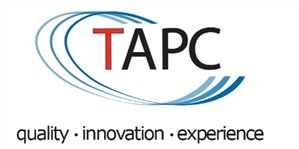
Anguil, founded in 1978, has gained its recognition and reputation as one of the leaders in manufacturing, servicing and installation of oxidation technologies and heat recovery systems for various applications and industries. TAPC will incorporate Anguil’s oxidizer designs and heat recovery systems with their existing gas cleaning technologies for facilities throughout the region.
This partnership provides a local Anguil presence for sales, installation, fabrication and service needs. Customers in Australia can expect state of the art air pollution control equipment, dependable service and responsive support from two of the most reputable companies in the industry.
For more information on TAPC, please visit www.tapc.com.au
New Senior Sales Manager Joins Anguil
1,270 Comments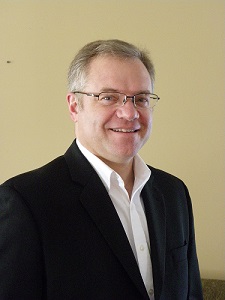
Located in Milwaukee WI, Anguil designs, manufactures, installs and services thermal and catalytic oxidizers, vapor combustion technologies and energy recovery systems throughout the world. Jim’s sales and application knowledge will be used to apply Anguil’s equipment design into a variety of industries, from composites and printing, to chemical and packaging. The addition of Jim further enhances Anguil’s ability to efficiently and effectively reduce emissions and energy consumption at industrial facilities.


